#Dyslexia is an illness
Text
Given the (warranted) suspicion given towards the disease denialism found in both Christian Science and Scientology, it can be said that if the claims of the neurodiversity movement were attached to organized religion, they too would be constantly lambasted.
#Christian Science#scientology#church of Christ scientist#Mary Baker Eddy#l ron hubbard#church of scientology#neurodiversity#neurodiversity movement#Just because a movement does not claim to be religious does not mean it isn’t cultic.#Scientific denialism#Denialism#autism is an illness#ADHD is an illness#Dyslexia is an illness#Down syndrome is an illness#Schizophrenia is an illness#Not all victims of a given illness will have an equally easy or difficult time#Not all illnesses have viral or environmental postnatal causes#I know most of the conditions the ND crowd champions are inborn#That still doesn’t mean they aren’t illnesses
24 notes
·
View notes
Text
As someone who is somewhat of a “veteran” of the online ND community, I’m disappointed in the lack of positivity and love for lesser known diverse cognitive conditions, and the opposing abundance of posts about “cures” or outdated criteria or treatments for those conditions. So, without further ado, I want to say hello to anyone with any of the disorders I’m listing, and give them the love and support that hardly anyone else in our community has… Shoutout to:
People with Down syndrome
People with Fragile X
People with William’s syndrome
People with dyslexia
People with dyspraxia
People with dyscalculia
People with dysgraphia
People with Prader-Willi syndrome
People with PANS or PANDAS
People with aphasia
People with a TBI (traumatic brain injury)
People with chronic/early onset mental illnesses
People with cerebral palsy
People with FASD or were otherwise disabled via other substances in utero
And many, many more I may have forgotten to list (but still support and love, I will add more to my list)
You are all beautiful and wonderful, and you all deserve so more love, appreciation, acceptance and support. You are just as neurodiverse as the rest of us, and your voices deserve to be heard and amplified.
I love you all ❤️
#autism#autistic#actually autistic#neurodivergent#actually neurodiverse#audhd#sensory processing disorder#down syndrome#fragile x#fragile x syndrome#williams syndrome#dyslexia#dyspraxia#dyscalculia#prader willi#aphasia#tbi#traumatic brain injury#chronically ill#chronic mental illness#cerebral palsy#fasd#neurodivergent love#dysgraphia#pans#pandas
8K notes
·
View notes
Text
shoutout to slow learners. shoutout to people who take a very long time to parse and grasp new concepts. shoutout to people who struggle to follow directions. shoutout to people who can't perform a task just after watching someone else do it. shoutout to everyone who needs learning aids, needs to take notes, needs to try multiple times, and needs to be told the explanation repeatedly.
you're not dumb. you're not lesser. you're not doing it on purpose. everyone learns at their own pace, and people forcing you to learn faster than you can are the ones causing a disruption in your ability to learn. it's not your fault.
#autism#adhd#schizophrenia#ocd#dyslexia#mental illness#neurodivergence#neurodivergent#neurodiverse#disabled#disability#schizospec#schizospectrum#developmental disorders#downs syndrome#learning disorders#mad punk#mad pride#madpunk
13K notes
·
View notes
Text
This is your daily reminder that "neurodivergent traits" do not exist.
"Neurodivergent" is an extremely broad term that refers to anyone who has some kind of neurological and/or psychiatric condition that causes them to be significantly different from most of society. It's up to the person themselves whether they want to use that label based on their personal experience, but here's a (non-exhaustive) list of conditions that can be neurodivergent:
Autism spectrum disorder
Attention-deficit/hyperactivity disorder
Dyslexia
Dyscalculia
Dysgraphia
Dyspraxia
Sensory processing disorder
Auditory processing disorder
Visual processing disorder
Various kinds of mutism
Language disorders
Tourette's Syndrome and other tic disorders
Functional neurological disorder
Aphantasia
Prosopagnosia
Synthesia
Conduct disorder
All personality disorders
Obsessive-compulsive disorder
Bipolar disorder
Schizophrenia and schizoaffective disorder
Fetal alcohol syndrome/fetal alcohol spectrum disorder
Post-traumatic stress disorder and complex post-traumatic stress disorder
Dissociative identity disorder, OSDD-1a and OSDD-1b
Traumatic brain injury
I could go on.
For a "neurodivergent trait" to exist, it would have to apply to all of those, plus more conditions I forgot to include. Obviously not possible. The only actual "neurodivergent trait" would be "you have a neurological/psychiatric condition".
If you mean autistic and ADHD traits, say that. If you mean mood disorder traits, say that. Neurodivergent is such a broad term, you need to use accurate language to ensure you don't accidentally spread misinformation (which has happened multiple times with the term "neueodivergent traits".)
#neurodivergent#neurodiversity#neurodivergency#actually neurodivergent#mental health#mentally ill#disabled#autism#adhd#ocd#dyslexia#dyscalculia#tic disorder#personality disorder#ptsd#cptsd#bipolar disorder#schizophrenia
2K notes
·
View notes
Text

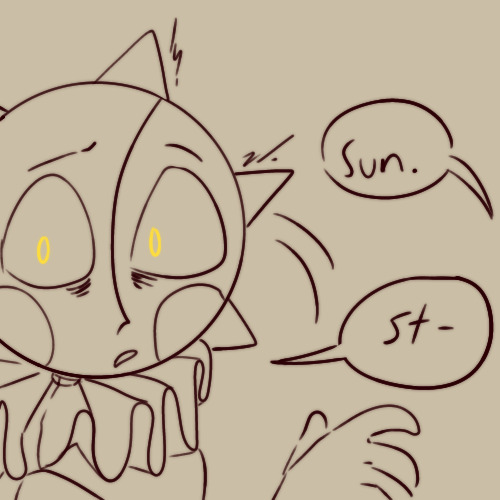


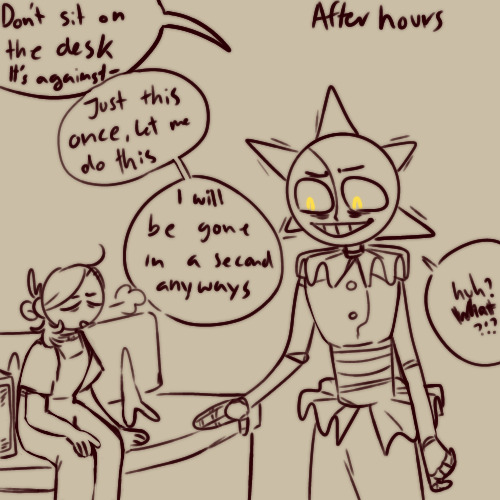
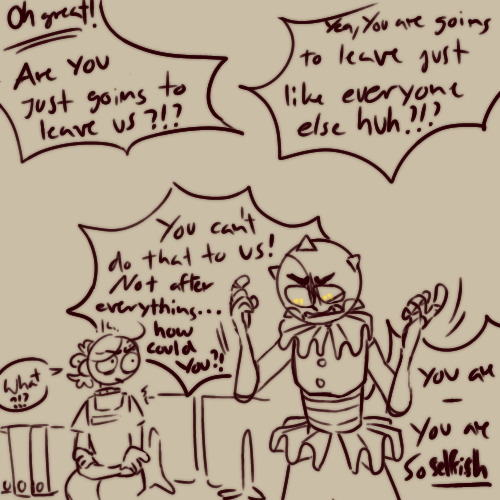

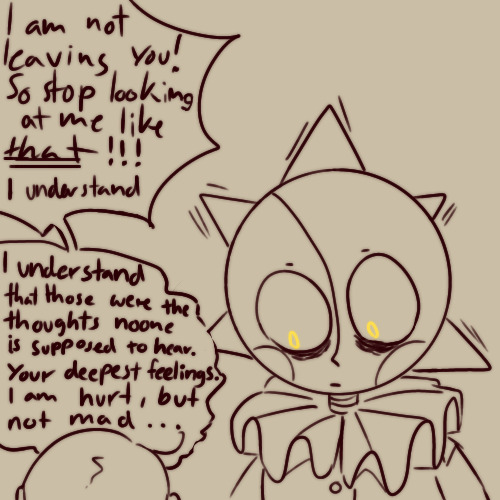
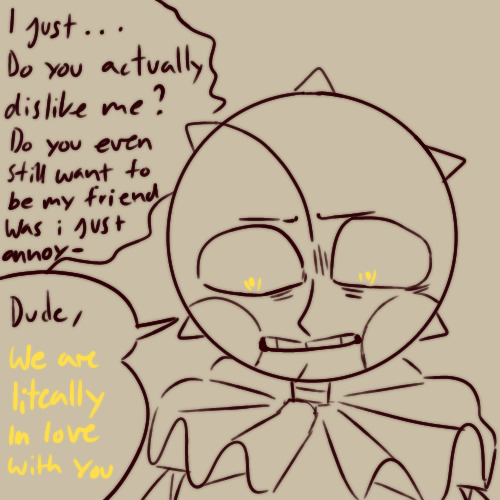

Part two of that short comic i made for @garbagechocolate s really cool truth virus au
Y/N is angry and hurt but understands the situation and is worried for their friend. Also both Sun and Y/N have anxiety
Sun is having a time, thats for sure
#truth virus au#daycare attendant x y/n#daycare attendant x reader#sundrop#my art#look i am bad at writing conflicts because i just usually forgive everything imidiatly so its hard to imagine y/n being angry#i am not fully happy with this but its ok#also please do not read it too carefully my dyslexia punched me in the face while i made this#i love it when i just forget letters in words just because i mostly recognize words by their shape and not by what letters are in there#i guess ill also have to make a part 3 huh
2K notes
·
View notes
Text

This is me right now trying to read Franz Kafkas Metamorphosis for my Drama and Theatre Studies exam
#punk#chronic pain#actually autistic#autism#autistic community#mental illness#actually neurodiverse#adult adhd#adhd stuff#adhd struggles#dyslexia#dyslectic#metamorphosis#franz kafka#novella#light novel#theatre#frantic assembly#attention deficit disorder (add)#attention deficit hyperactivity disorder#reading#literature#screenplay#metaphore#nature vs nurture#total drama#theatre student#theatre stuff#dyslexic#dyspraxia
537 notes
·
View notes
Text
From the lack of care for community health, to the constant thread of eugenics, and disproportionate effect on people of color and queer people the similarities between the HIV/AIDS epidemic and the ongoing covid pandemic are eerie.
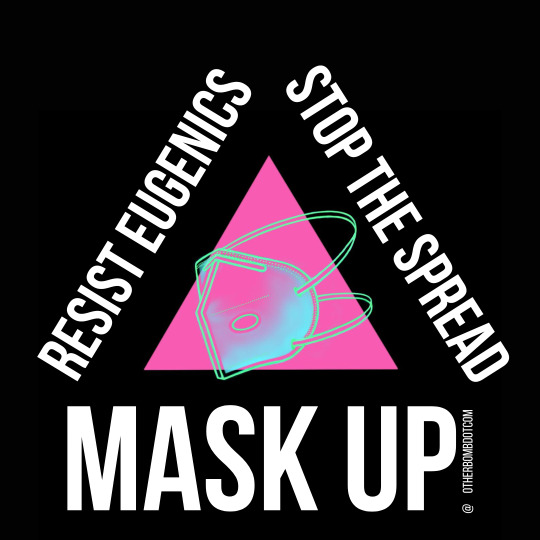
#wear a mask#mask up#lgbtq community#lgbtqplus#still coviding#covid isn't over#eugenics#keep masks in healthcare#hiv aids#queer artist#dyslexia#chronic illness
685 notes
·
View notes
Text
audience test
How many disorders do you match with me
NPD
ASPD
STPD
ADHD
AUTISM
SENSORY PROCESSING DISORDER
MAN LOVING MEN (the worst one)
C-DID
C-PTSD
DYSLEXIA
LIKES PICKLES
BIPOLAR / MANIC DEPRESSION
GENERALIZED ANXIETY DISORDER
SELECTIVE MUTISM (fluctuates)
HYPER MOBILITY DISORDER
RESTLESS LEG SYNDROME
INSOMNIA
HCD (huge cock disorder. contagious so I have to be quarantined)
(all medically recognized. don't come @ me because I'm a fucked up guy) ((huge cock disorder is self diagnosed but you have to believe me))
this was actually a very vulnerable post to make but I want ableists to block me and we should not be ashamed to be disordered
#k9rambles#target audience#npd posting#actually aspd#actually npd#actually autistic#actually did#actually mentally ill#actually schizotypal#schizotypal#cluster b#cluster a pd#cluster b positivity#cluster b safe#cluster a positivity#selective mutism#semiverbal#dyslexia#c ptsd#cdid#cdid system#polyfragmented#actually polyfrag#bipolar depression#actually stpd#stpd#actually adhd#neurodivergent#autistic artist#insominac
93 notes
·
View notes
Text
Had a conversation with an able bodied neurotypical today (a group of people I had forgotten existed) about his schedule and whether or not he has daily pain and was shell shocked by how much this guy gets done and his lack of pain most days. (His only pain is soreness after basketball practice or the gym)
I’m always quick to beat myself up because other students can get all their work done in the same or less time than I get to do it, where I struggle and often fall behind. But that isn’t fair and I wouldn’t say that to other disabled people, so I shouldn’t say it to myself.
I don’t get the proper accommodations, and unmasking has led to less burn out and self destructive behavior, but it’s raised everyone’s expectations of me (everyone=ablebodied neurotypicals in my life). I know the guy I talked to would be actually destroyed by what I live with day to day, which doesn’t make him lucky for not living with it, but makes me strong for even getting close to all of my work done.
Here’s your daily reminder that you are not lazy or failing for being disabled by your disability. It’s not your fault, and there are people who understand what you’re going through and you are not alone. <3
#disabled#chronic pain#chronic illness#chronic fatigue#heds#internalized ableism#autism#dyslexia#adhd#self love#you are strong#you are loved
275 notes
·
View notes
Text
this is a gentle reminder that when learning languages, you need to keep in mind the "mother tongue rule". if you're dyslexic, dysgraphic, have speech impediment, social anxiety or something else, if you have problems with reading, writing or talking to people even using your mother tongue, then you can't blame yourself for not being fluent enough or compare yourself to others when having these problems with your target language. everyone is different. this difference is not only about methodology, speed, or ressources. it is also about disability and mental illness. please don't be too hard on yourself.
and if you know someone who has these problems, be patient and understanding. don't insult them or laugh at them.
#langblr#languages#language learning#polyglot#studyblr#disability#mental illness#social anxiety#autism#neurodivergent#dyslexia#dysgraphia
115 notes
·
View notes
Text
"Why do you always want to headcanon a character as neurodivergent?"
Because y'all won't give us the representation. You'll take all our good qualities and all of our struggles to expand your character profile but you won't actually make them ND. Because God forbid there is a character who casually has autism or adhd or bpd or dyslexia or literally any type of neurodivergency. That absolutely can't happen. Instead, you'll turn the symptoms into "quirky character traits" to make them interesting. All the while treating neurodivergent people like they're incompetent, inconvenient or dangerous.
Like, make it make sense 🙄
#Adhd#Asd#Autism#Neurodivergent#Neurodivergence#dyslexia#Ocd#Bpd#borderline personality disorder#auditory processing disorder#neurodivergent brain#adhd brain#Mental health#Executive dysfunction#Rsd#dyscalculia#dyspraxia#mentally ill#Aspd#Npd#Osdd#Pretty sure my brain is forgetting a while bunch of them rn
925 notes
·
View notes
Text
I am out here having a body despite the three d's: dysmorphia, dysphoria, and dissociation
Other noteable d's: dyslexia, depression, dicks
#we wrote this! wow!#mental illness#DID#dissociative identity disorder#OSDD#did osdd#otherwise specified dissociative disorder#body dysmorphia#dysphoria#trans#transgender#transmeds dni#dissociative system#dissociation#dyslexia#deppresion
60 notes
·
View notes
Text
Happy Easter everyone :)
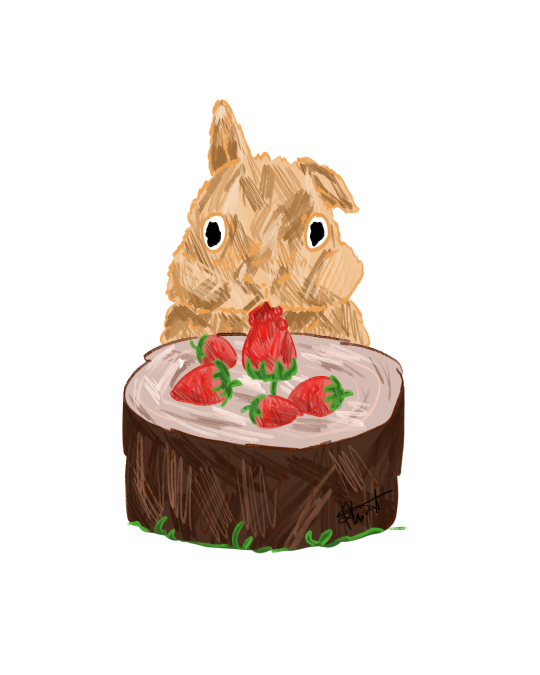
head empty, no thoughts, just strawberies.
#small artist#small streamer#small business#small shop#drawing#artists on tumblr#illustration#digital art#clip studio paint#cps#art#design#lgbtqia#lgbtq#adhd#dyslexia#dyslexic#autism#depression#mental health#mental illness#bunny#rabbit#bunny rabbit#strawberry#bunny art#pet portrait#animal art#easter#easter 2024
17 notes
·
View notes
Text

#adhd#autism#add#ocd#dyslexia#anxiety#bipolar#depression#mental illness#neurodivergent#neurodivergent in a neurotypical world#fuck the neurotypical world
20 notes
·
View notes
Text
Mental health diagnoses are capitalist constructs
“Mental and physical diagnoses aren’t objective facts that exist in nature, even though we usually think of them this way. While the experiences and phenomena that fall under different diagnostic categories are, of course, real, the way that we choose to categorise them is often influenced by systems of power. The difference between ‘health’ and ‘illness’, ‘order’ and ‘disorder’ is shaped by which kinds of bodies and minds are conducive to capitalism and the state. For example, the difference between ‘ordinary distress’ and ‘mental illness’ is often defined by its impact on your ability to work. The recent edition of the DSM, psychiatry’s comprehensive manual of ‘mental disorders’, mentions work almost 400 times – work is the central metric for diagnosis.
“When we look across history, it becomes even more obvious that diagnosis is tied to capitalist metrics of productivity: certain categories of illness have come in and out of existence as the conditions of production have changed. In the 19th century, the physician Samuel A. Cartwright proposed the diagnosis of ‘drapetomania’, which would describe enslaved Black people who fled from plantations. While we might think of drapetomania as a historical outlier among ‘true’ and ‘objective’ diagnoses, it is underpinned by the same logic as other diagnoses: it describes mental or physical attributes that make us less exploitable and profitable. In the 1920s, medical and psychological researchers became interested in a pathology called ‘accident-proneness’, which was applied to workers who were repeatedly injured in the brutal and dangerous factory conditions of the industrial revolution. Dyslexia, a diagnosis I have been given, also didn’t emerge until the market began to shift from manual labour towards jobs that relied on reading and writing, when all children were expected to be literate. Despite having problems with reading, I understand that in a world where reading and writing weren’t so central to our daily life, there would be no need to name my dyslexia, no need to diagnose it.
“As a system of state power, many of us rely on diagnosis to get the material things that we need to survive in the world. When illness or disability interferes with our ability to work, we often need a diagnosis to justify our lack of productivity – and for some, diagnosis is the necessary pathway to getting state benefits. If we want to get access to medication, treatment or other healing practices provided by the state, diagnosis is also the token that we need to get there. This is made all the more complicated by the fact that doctors have the power to dispense and withhold diagnoses, regardless of our personal desires. When it comes to psychiatric diagnosis, most of us know someone who has had to fight or wait for years for a diagnosis that would improve their quality of life – particularly in the realm of autism, ADHD and eating disorders. The internalised racism, sexism, classism or ableism of doctors often gets in the way of our ability to access the diagnoses that we want and need. Then there are those of us that are given diagnoses that we reject, a process that we also have no say in ...
“When we understand that psychiatric diagnoses are constructed, contested, and aren’t grounded in biological measures, the idea of ‘self-diagnosis’ starts to feel less dangerous or controversial. Self-diagnosis is grounded in the idea that, while the institution of medicine may hold useful technologies and expertise, we also hold valuable knowledge about our bodies and minds. I know many people who have found solace and respite in communities for various diagnoses, even if they don’t have an official diagnosis from a doctor. These spaces, which respect the wisdom offered by lived experience, can be valuable forums of knowledge-sharing and solidarity. Self-diagnosis also pushes against an oppressive diagnostic system that is so centred around notions of productivity.”
#anti-psychiatry#psychiatry#psychology#mental health#mental illness#mental disorders#diagnosis#mental healthcare#healthcare#neurodivergence#drapetomania#dyslexia#autism#adhd#benefits#disability#capitalism
69 notes
·
View notes
Photo

how the other sees neurodiverse
#neurodivergent#adhd#mental illness#medication#mental health#nd#neurotypical#existentialism#art#drawing#sketch#sketchbook#actually neurodiverse#add#80hd#depression#autism#anxiety#dyslexia#tourettes#bipolar
495 notes
·
View notes